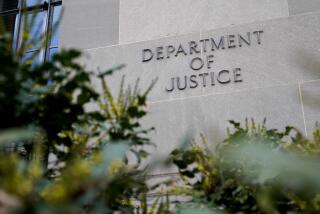For Kosovo Talks, U.S. Would Let Sanctions Ebb
- Share via
WASHINGTON — The Clinton administration will suggest a gradual lifting of remaining sanctions against the rump Yugoslavia if President Slobodan Milosevic agrees to a negotiated settlement of the crisis in Kosovo, a senior official said Monday.
In an effort to pressure Milosevic into unconditional negotiations with Kosovo’s ethnic Albanians, who make up 90% of the population of the Serbian province, U.S. representatives will offer a package Wednesday of incentives and sanctions to the six-nation Contact Group on the Balkans meeting in Rome, the official said.
“If the Yugoslav government accepts--and implements--our framework for negotiations, we are prepared to offer some fairly attractive incentives,” the official told reporters. But if Milosevic refuses to go along, he added, Washington wants new sanctions to “kick in automatically.”
The official did not detail either the incentives or the sanctions, although he said the rewards “are fairly obvious” and include an offer by the United States and its allies to try to re-integrate Yugoslavia, consisting of Serbia and the much smaller Montenegro, into the world economy.
Another senior official said earlier that “the cupboard of additional sanctions is almost bare but not entirely bare.” He added: “It is very important that Rome offer some incentives for good behavior in the future but not rewards for what has been pretty bad behavior in the past.”
Both officials said the situation in Kosovo is becoming increasingly dangerous because of an escalating offensive by the Yugoslav army against ethnic Albanian separatists. There is a growing danger that the conflict could ignite a war between Yugoslavia and Albania or spill across the border into Macedonia, a former Yugoslav republic with a large ethnic Albanian population of its own, the officials said.
*
Backed by helicopter gunships, the Yugoslav army clashed Monday in Kosovo with ethnic Albanians and reported killing three insurgents, Associated Press reported from Pristina, the Kosovo capital. Reports from ethnic Albanians said up to a dozen people--none militants--were killed.
Journalists attending a funeral for nine ethnic Albanians killed last week saw Yugoslav army helicopters zooming over a village near the border with Albania and heard distant, heavy machine-gun fire, AP reported.
The latest violence further damaged chances for a negotiated solution. The clashes began early Monday when a group of militants attempted to smuggle weapons into Kosovo from Albania and fired at troops, according to Yugoslav government reports.
About 150 people have been killed in Kosovo since Feb. 28, when Serbian security forces first launched a massive sweep they say was aimed at wiping out militant ethnic Albanian separatists.
Kosovo enjoyed autonomy within the former Yugoslav federation until 1989, when Milosevic revoked the charter, imposing direct rule from Belgrade, the capital of both Yugoslavia and Serbia.
Ethnic Albanian militants are demanding independence for the province, an outcome the Yugoslav government rejects. One of the senior U.S. officials said Washington considers unacceptable both independence for Kosovo and a continuation of the status quo of rule by the minority Serbs. Something between those extremes, he said, is acceptable to the United States.
The Rome meeting will be the third in less than two months of the Contact Group, which consists of the United States, Britain, Germany, Italy, France and Russia. On March 9 in London, the group adopted a set of sanctions including a tighter arms embargo against Yugoslavia, but on March 25 in Bonn, the six-nation group softened its approach.
*
The U.S. official said Washington will not accept any attempt by its allies to “water down” the package of incentives and sanctions. If the Contact Group rejects the U.S. approach, he said, the administration will launch diplomatic efforts of its own to try to defuse the crisis. “We will not settle for an agreement just for the sake of agreement,” the official said. “Consensus is not the goal here.”
In Luxembourg, meanwhile, foreign ministers of the European Union threatened new sanctions Monday, declaring that Milosevic has not done enough to seek a peaceful settlement in Kosovo.
More to Read
Sign up for Essential California
The most important California stories and recommendations in your inbox every morning.
You may occasionally receive promotional content from the Los Angeles Times.













